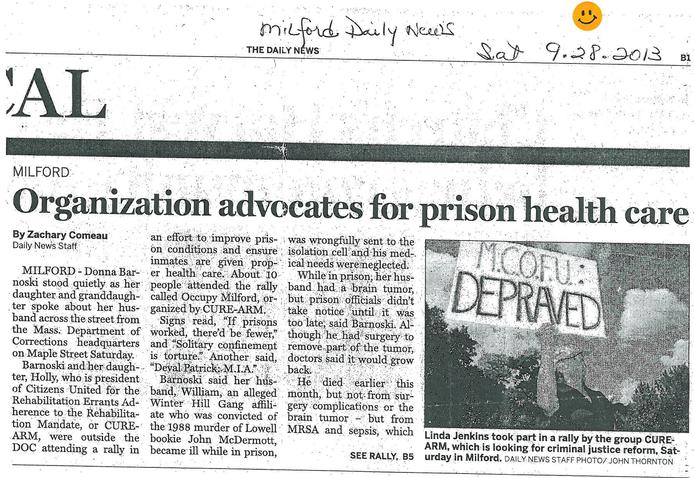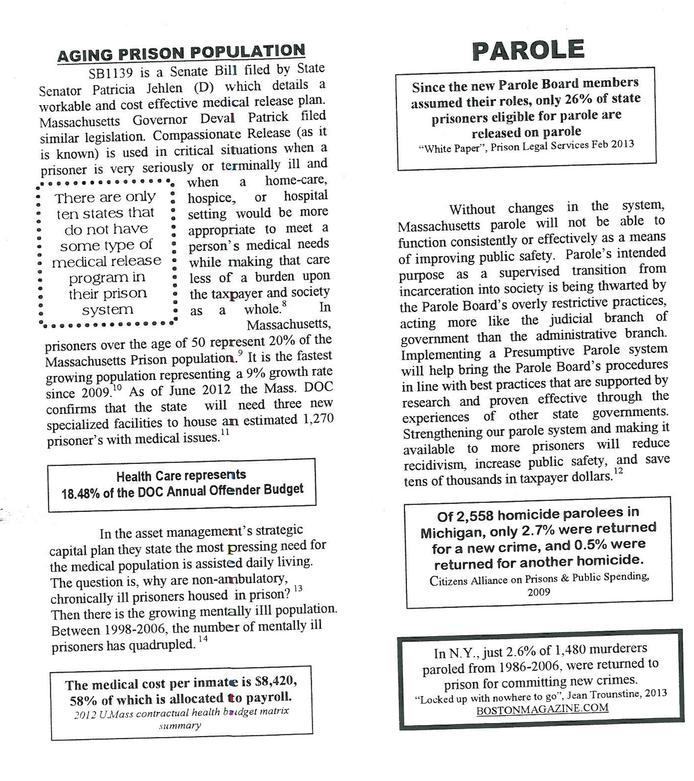
Transcription
The following article appeared in the Milford Daily News. CURE-ARM and Timothy Muise take absolutely no credit for it, but are appreciative of Mr. Comeau's article. Thank you.
Timothy J. Muise
Steering Committee Coordinator
CURE-ARM
Milford Daily News Sat 9.28.2013 :)
MILFORD
Organization advocates for prison health care
By Zachary Comeau
Daily News Staff
MILFORD - Donna Barnoski stood quietly as her daughter and granddaughter spoke about her husband across the street from the Mass. Department of Corrections headquarters on Maple Street Saturday.
Barnoski and her daughter, Holly, who is president of Citizens United for the Rehabilitation Errants Adherence to the Rehabilitation Mandate, or CURE-ARM, were outside the DOC attending a rally in an effort to improve prison conditions and ensure inmates are given proper health care. About 30 people attending the rally called Occupy Milford, organized by CURE-ARM.
Signs read, "If prisons worked, there'd be fewer", and "Solitary confinement is torture." Another said, "Deval Patrick, M.I.A."
Barnoski said her husband, William, an alleged Winter Hill Gang affiliate who was convicted of the 1988 murder of Lowell bookie John McDermott, became ill while in prison, was wrongfully sent to the isolation cell and his medical needs were neglected.
While in prison her husband had a brain tumor, but prison officials didn't take notice until it was too late, said Barnoski. Although he had surgery to remove part of the tumor, doctors said it would grow back.
[photo caption: Linda Jenkins took part in a rally by the group CURE-ARM, which is looking for criminal justice reform, Saturday in Milford. DAILY NEWS STAFF PHOTO/JOHN THORNTON]
He died earlier this month, but not from surgery co0mplications or the brain tumor - but from MRSA and sepsis, which
SEE RALLY, B5
AGING PRISON POPULATION
SB1139 is a Senate Bill filed by State Senator Patricia Jehlen (D) which details a workable and cost effective medical release plan. Massachusetts Governor Deval Patrick filed similar legislation. Compassionate Release (as it is known) is used in critical situations when a prisoner is very seriously or terminally ill and when a home-care, hospice, or hospital setting would be more appropriate to meet a person's medical needs while making that care less of a burden upon the taxpayer and society as a whole. [There are only ten states that do not have some type of medical release program in their prison system.] In Massachusetts, prisoners over the age of 50 represent 20% of the Massachusetts Prison population. It is the fastest growing population representing a 9% growth rate since 2009. As of June 2012 the Mass. DOC confirms that the state will need three new specialized facilities to house an estimated 1,270 prisoners with medical issues.
[Health Care represents 18.48% of the DOC Annual Offender Budget]
In the asset management's strategic capital plan they state the most pressing need for the medical population is assisted daily living. The question is, why are non-ambulatory, chronically ill prisoners housed in prison? Then there is the growing mentally ill population. Between 1998-2006, the number of mentally ill prisoners has quadrupled.
[The medical cost per inmate is $8,420, 58% of which is allocated to payroll. 2012 U. Mass contractual health budget matrix summary]
PAROLE
[Since the new Parole Board members assumed their roles, only 26% of state prisoners eligible for parole are released on parole. "White Paper", Prison Legal Services Feb 2013]
Without changes in the system, Massachusetts parole will not be able to function consistently or effectively as a means of improving public safety. Parole's intended purpose as a supervised transition from incarceration into society is being thwarted by the Parole Board's overly restrictive practices, acting more like the judicial branch of government than the administrative branch. Implementing a Presumptive Parole system will help bring the Parole Board's procedures in line with best practices that are supported by research and proven effective through the experiences of other state governments. Strengthening our parole system and making it available to more prisoners will reduce recidivism, increase public safety, and save tens of thousands in taxpayer dollars.
[Of 2,558 homicide parolees in Michigan, only 2.7% were returned for a new crime, and 0.5% were returned for another homicide. Citizens Alliance on Prisons & Public Spending, 2009]
[In N.Y., just 2.6% of 1,480 murderers paroled from 1986-2006, were returned to prison for committing new crimes. "Locked up with nowhere to go", Jean Trounstine, 2013 BOSTONMAGAZINE.COM]
Other posts by this author
|
2017 jun 24

|
2017 jun 24

|
2017 jun 24

|
2017 jun 24

|
2017 jun 18

|
2017 jun 15

|
More... |




Replies